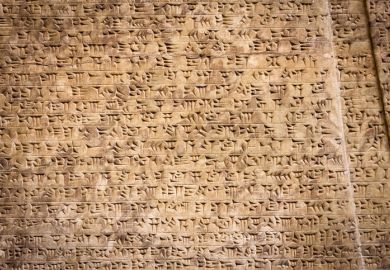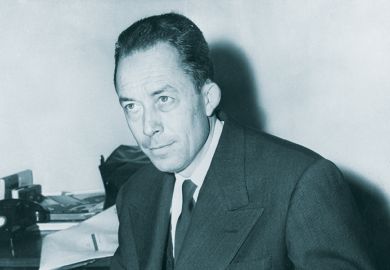One day in 1908 T. S. Eliot, then a 20-year-old student at Harvard University, was browsing in a bookshop and came across a book by Arthur Symons, first published in 1899 and just reprinted: The Symbolist Movement in Literature . It was a coup de foudre , "a revelation... whole new feelings", which enabled him to see possibilities for a new diction in English poetry and transformed his life: "The kind of poetry that I needed to teach me the use of my own voice did not exist in English at all, it was only to be found in French," he wrote 30 years later, an acknowledgement he repeated throughout his life, notably in 1948, the year of his Nobel prize:
"Without the tradition which starts with Baudelaire and culminates in Valery, my own work would hardly be conceivable."
After reading Symons's book, Eliot threw himself into the study of French language and literature, and in 1910 embarked on his pilgrimage to France. Paris was then the cultural and artistic capital of the western world. The city's effervescent literary scene was dominated by La Nouvelle Revue Française (NRF), the journal launched by Andre Gide in 1908 that became a forum for innovative contemporary poetry and literature. The list of its contributors charts the course of French literature in the 20th century. Among them were such illustrious poets as Paul Claudel, Saint-John Perse, Charles Peguy, Valery Larbaud, Paul Valery; thinkers such as Bergson, Julien Benda, Charles Maurras; as well as a host of other significant poets and writers and philosophers.
Eliot found lodgings in the heart of the Latin Quarter, at a pension in Rue St Jacques, behind the Sorbonne, and plunged into the intellectual life of the city. Walking in the nearby Luxembourg Gardens he would come across Anatole France, or Rilke, or Gide; it was heady for a young American poet. Through his French teacher, Alain-Fournier - the future author of Le Grand Meaulnes - and Fournier's brother-in-law, Jacques Riviere, later an editor of the NRF, he learned the highways and byways of French literature, and years later he modelled his own Criterion on the NRF.
It seemed that Eliot had found his poetic "homeland": " La France représentait pour moi la poésie ," he reminisced later; and for a while he wanted to stay in Paris and "scrape along", writing in French. It is not unfair to the poet to say that the poems he wrote in French are undistinguished and derivative. Luckily, he discovered "the little island north of the English Channel", and in due course moved to London. The rest, as they say, is literary history.
There were also philosophers and thinkers who influenced Eliot's intellectual evolution. He waited hours to attend Bergson's lectures at the Collège de France, and he admired Benda, the author of La Trahison des Clercs , but he was most impressed by Maurras, the rightist leader of the Royalist Party. "Classicist, Catholic, royalist," the description of Maurras by a contemporary matches Eliot's definition of himself as "Classicist, Anglican, monarchist", and perhaps his so-called anti-Semitism was a residue of Maurras's influence. But Chinmoy Guha's thoughtful and instructive book does not deal with such maîtres à penser , rather he concentrates on the maîtres d'art - those poets who crucially marked Eliot's poetic development: Baudelaire, Jules Laforgue, Tristan Corbi re, Larbaud and Claudel, to each of whom he devotes a long and pertinent chapter.
Guha's thesis - for Where the Dreams Cross is a doctoral thesis, mercifully short, well written and free from modish academese - is that critics and biographers have underestimated the impact of these poets on Eliot's works for fear of casting doubt on his originality, and that they treat his French phase as short-lived juvenilia. Guha maintains that, au contraire , the impact of certain symbolist poets on Eliot was deep and lasting, but that this by no means diminishes his unique genius and stature.
Not for Eliot Mallarme's "laboured opacities", or Rimbaud's Romantic " un long, immense et raisonné dérèglement de tous les sens ", or Verlaine's tender lyrical élan , rather he preferred Baudelaire's longing for order and faith - " La tout n'est qu'ordre et beauté / Luxe, calme et volupté " (Eliot thought " L'Invitation au Voyage " one of Baudelaire's finest poems): the fusion of classical form and new content, the use of a language that "turns mud into gold", as Baudelaire himself put it.
Like Baudelaire, Eliot transformed poetic discourse and set it on a new path. Yet the poet who ignited his genius and determined the course of his life was not Baudelaire but a lesser symbolist - Laforgue. The encounter was incandescent, "a demonic possession" by another poet, which as he wrote later "changed, metamorphosed (him), within a few weeks even, from a bundle of second-hand sentiments into a person". Laforgue died at the age of in 1887, one year before Eliot was born, leaving a substantial body of work collected in three volumes. One can imagine the meeting of the young American disciple and the older French master had Laforgue lived long enough. Laforgue's project to be "absolutely original", his irony, his rejection of " extériorité ", his terrible suffering from tuberculosis that made him a poète maudit , left a profound impression on young Eliot, whose early poetry is distinctly Laforguian.
Guha maintains that, contrary to what Eliot "experts" state, his relationship with Laforgue - who is now considered a minor poet and not much read - was not merely a youthful infatuation that had faded by the time he wrote The Waste Land , but continued all his life. He backs his argument by comparing lines and phrases and thoughts that Eliot "borrowed" or "lifted" from Laforgue, as he did from his other favourite French poets. (As Eliot famously said: "Mediocre poets imitate, great poets steal.")
Guha's book casts a fresh light on Eliot's poetry, and his enthusiasm for the poet is infectious. It is a shame that his book is so appallingly produced - cheap paper, mistakes galore on almost every page, lack of copy editing, and some errors of translation that change the meaning (luckily the author gives the original French quotations). But it is to the credit of the publishers that at least they have published his book.
Shusha Guppy is London editor, Paris Review .
Where the Dreams Cross: T.S. Eliot and French Poetry
Author - Chinmoy Guha
Publisher - Papyrus, Calcutta
Price - £5
Pages - 252
Register to continue
Why register?
- Registration is free and only takes a moment
- Once registered, you can read 3 articles a month
- Sign up for our newsletter
Subscribe
Or subscribe for unlimited access to:
- Unlimited access to news, views, insights & reviews
- Digital editions
- Digital access to THE’s university and college rankings analysis
Already registered or a current subscriber? Login



